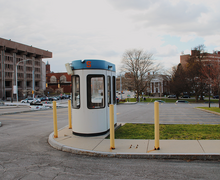Palmer: Driving safely in the winter can be easy, fun
Snowstorms and blizzards might stop some people from driving, but with preparations and strategies, you can not only be safe in your car but also have fun. Getting a car ready for the kind of winters we face here in Syracuse isn’t difficult to do, and the time you put in will pay off in the long run.
Rubber
Tires are perhaps the most important component of your car, because they’re the only part that touches the road. During colder months, you’re going to want winter tires fitted to your car. Bridgestone Blizzaks and Michelin X-Ices are two reliable choices. They are made in almost all tire sizes. Some might claim all-season tires are sufficient, but I like to consider them “no season” tires because of their inability to excel at anything. They’re mediocre in all conditions because they have too many compromises to allow the tire to perform sufficiently at all times. Even if your car has all-wheel or four-wheel drive, it stops and corners the same as two-wheel drive cars when there’s snow and ice on the road. So unless your plan is to exercise your insurance, winter tires are the best choice.
Battery
Getting stranded in the middle of nowhere when the temperature is dipping into the single digits isn’t a fun experience. That’s why going into winter with a strong, healthy battery is an absolute must. Electronics don’t like the cold, and you’re doing yourself a disservice to be driving around in a car with a bad battery. It’s extremely easy to take a trip down to your local auto parts store and get the health of your battery checked. After, you can ensure your friends won’t hate you for having to come jump start your car.
Driving
For people who haven’t driven in snow before, it can be a daunting task. While it’s not something to take lightly, snowy expeditions can be as easy as a summer’s drive.
The first thing to know is not to make any sudden, extreme movements. Accelerating, braking and turning inputs should all be small and done slowly. If you slam on the brakes, you will slide and your passengers will scream.
Depending on the car’s drivetrain, you may have to adjust your driving style. Rear-wheel drive cars will kick the rear end out when you apply the gas in a corner, so being aware of how your car acts in snow is important. Most of the time, all-wheel and front-wheel drive cars will fare the best when the going gets tough.
Your car is constantly speaking to you through the steering wheel and chassis, so it’s important to listen. Dazing off and assuming one patch of road is the same as the one you just traveled over could be your undoing. Giving your undivided attention to the road in hazardous conditions is a necessity.
For the car people …
Everything so far has been about preparation and safety, but there’s way more to winter than going from point A to B.
Snow allows the opportunity to let loose the rally car driver in all of us. Drifting is the name of the game, and to me it’s about as fun as it gets. If you aren’t an experienced winter driver, I do not recommend this, but if you know what you’re doing, go for it.
Being in control of an out of control car is what makes drifting so much fun. Do not try this on the streets, especially if you’re trying to teach yourself, because it can easily be considered reckless driving by law enforcement. Instead, go find a giant, empty parking lot without any poles and start experimenting.
Getting the car to go sideways in a rear-wheel drive car is easy. Just begin feeding in the gas slowly until you feel it start to rotate, then counter-steer to hold the drift.
Making a front-wheel drive car go sideways takes a little bit more work, because you can’t use power to kick the rear end out. Instead we do something called a handbrake turn. When you’re turning into a corner, pull up on your handbrake and feel the car begin to rotate. Once you’ve got the car in a controlled slide you can counter-steer to bring it back in line, similar to rear-wheel drive cars.
There’s more than just fun to handbrake turns, though. If you ever find yourself experiencing terminal understeer, give the handbrake a quick tug, and the rear end will come around and save you.
Zac Palmer is a sophomore magazine major. His column appears weekly in Pulp. He can be reached at zipalmer@syr.edu
Published on February 14, 2016 at 9:23 pm





